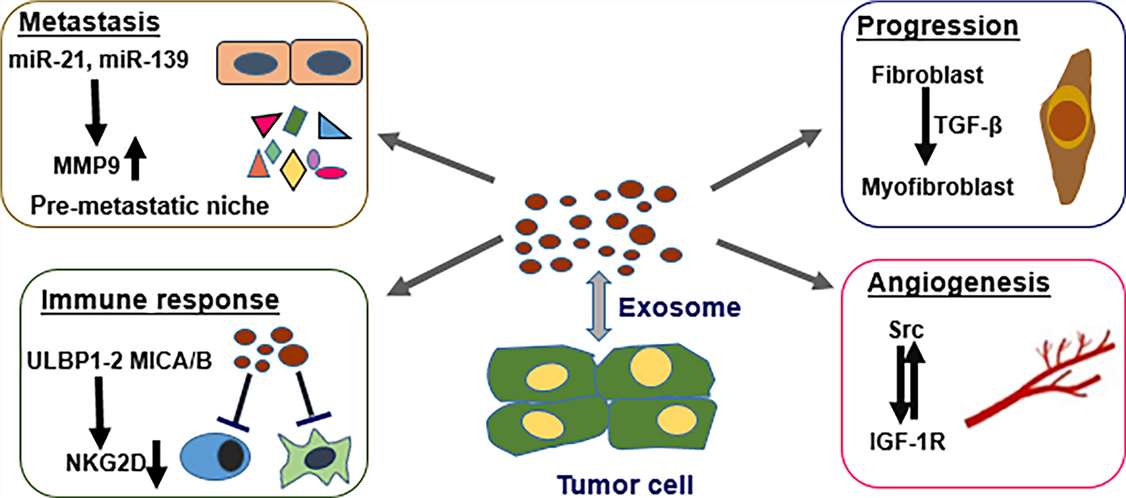Prostate Cancer Exosome Research Solution
Online InquiryProstate cancer (PCa) is the second most common cancer type among men globally. Most patients with PCa present with locally advanced or metastatic disease at the time of diagnosis, thus limiting the effectiveness of conventional treatment. The development of new diagnostic and therapeutic strategies for castration-resistant and chemo-resistant PCa is essential. Exosomes derived from PCa cells have shown great potential in the treatment and diagnosis of PCa.
The role of exosomes in prostate cancer
Exosomes deliver functional biomolecules, such as nucleic acids, lipids, and proteins to mediate the communication between cancer cells and stroma cells. Studies have shown that prostate cancer development, metastasis and chemoresistance are associated with exosomes loaded with these biomolecules, especially proteins, miRNAs, and lncRNAs. PCa cells regulate the surrounding stromal cells through exosomes, thereby regulating the microenvironment and promoting tumor growth and metastasis. Exosomes derived from PCa cells have been found to contribute to chemotherapy resistance in cancer. In addition, exosomes are promising carriers of drugs and other therapeutic molecules targeting PCa due to their high stability and low immunogenicity on lipid bilayer membranes. The isolation and detection of exosomes from body fluids can also be used for the non-invasive diagnosis of PCa.
- Exosomes promote PCa progression, involving miR-139, miR-21 and miR-100 containing exosomes
- Exosomes promote PCa cell growth along with metastasis, involving miRNA-21 and miRNA-139 containing exosomes
- Exosomes regulate angiogenic activity in the tumor microenvironment, involving c-Src tyrosine kinase, insulin-like growth factor 1 receptor (IGF-R) and focal adhesion kinase (FAK) containing exosomes
- PCa-originated exosomes enhance cancer cell evasion of immune response
 Fig. 1 Multiple roles of cancer originated exosomes in PCa. (Guangmo, Hu, 2022)
Fig. 1 Multiple roles of cancer originated exosomes in PCa. (Guangmo, Hu, 2022)
Prostate cancer exosome research solution at Creative Proteomics
Creative Proteomics is a leading custom service provider in the field of subcellular and single-cell research. We are dedicated to helping researchers and professionals understand PCa biology from an exosomal perspective, explore new PCa therapies and strategies and develop PCa biomarkers. Based on highly stable, reproducible, and sensitive platform, we can perform exosome isolation, characterization, identification, and quantitative analysis.
Specifically, we provide the following services, including but not limited to:
- Experimental design
- Cell culture and exosome isolation
- Labeling and purification of exosomes
- Identification of exosomes
- Exosome stability testing
- In vivo and in vitro detection of anticancer effects of exosomes
- Mass spectrometry (MS)-based exosome proteomics, metabolomics, and lipidomics
Major technology platform
- Subcellular proteomics
iTRAQ, SWATH, Label-free, PRM, various quantitative proteomic technologies to assist you in discovering key proteins of signal transduction pathways, discovering disease markers, and discovering drug targets.
- Subcellular metabolomics/lipidomics
Characterization of some of the key biochemical components involved in physiopathological processes at the subcellular level, including non-targeted screening and targeted analysis.
We appreciate your interest in our services. Let us know what you are trying to achieve and our team of experts will be in touch with you within one business day to discuss your needs. Contact us right now!
References
- Guangmo, Hu. "Roles and clinical application of exosomes in prostate cancer." Frontiers in Urology (2022): 4.
- Lorenc, Tomasz, et al. "Exosomes in prostate cancer diagnosis, prognosis and therapy." International Journal of Molecular Sciences 21.6 (2020): 2118.
* For Research Use Only. Not for use in diagnostic procedures.



